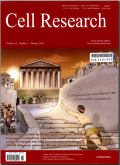Uncoupling therapeutic from immunotherapy-related adverse effects for safer and effective anti-CTLA-4 antibodies in CTLA4 humanized mice
Anti-CTLA-4 monoclonal antibodies (mAbs) confer a cancer immunotherapeutic effect (CITE) but cause severe immunotherapy-related adverse events (irAE). Targeting GTLA-4 has shown remarkable long-term benefit and thus remains a valuable tool for cancer immunotherapy if the irAE can be brought under control. An animal model, which recapitulates clinical irAE and CITE, would be valuable for developing safer CTLA-4-targeting reagents. Here, we report such a model using mice harboring the humanized Ctla4 gene. In this model, the clinically used drug, Ipilimumab, induced severe irAE especially when combined with an anti-PD-1 antibody;whereas another mAb, L3D10, induced comparable CITE with very mild irAE under the same conditions. The irAE corresponded to systemic T cell activation and resulted in reduced ratios of regulatory to effector T cells (Treg/Teff) among autoreactive T cells. Using mice that were either homozygous or heterozygous for the human allele, we found that the irAE required bi-allelic engagement while CITE only required monoallelic engagement As with the immunological distinction for monoallelic vs bi-allelic engagement, we found that bi-allelic engagement of the Ctla4 gene was necessary for preventing conversion of autoreactive T cells into Treg cells. Humanization of L3D10, which led to loss of blocking activity, further increased safety without affecting the therapeutic effect. Taken together, our data demonstrate that complete CTLA-4 occupation, systemic T cell activation and preferential expansion of self-reactive T cells are dispensable for tumor rejection but correlate with irAE, while blocking B7-CTLA-4 interaction impacts neither safety nor efficacy of anti-CTLA-4 antibodies. These data provide important insights for the clinical development of safer and potentially more effective CTLA-4-targeting immunotherapy.
28
We thank Wei Wu and Xiao Ding for technical assistance. This work is supported by NIH grantsAI64350,CA171972 and AG036690;a grant from Oncolmmune,Inc
2018-08-29(万方平台首次上网日期,不代表论文的发表时间)
共15页
433-447






